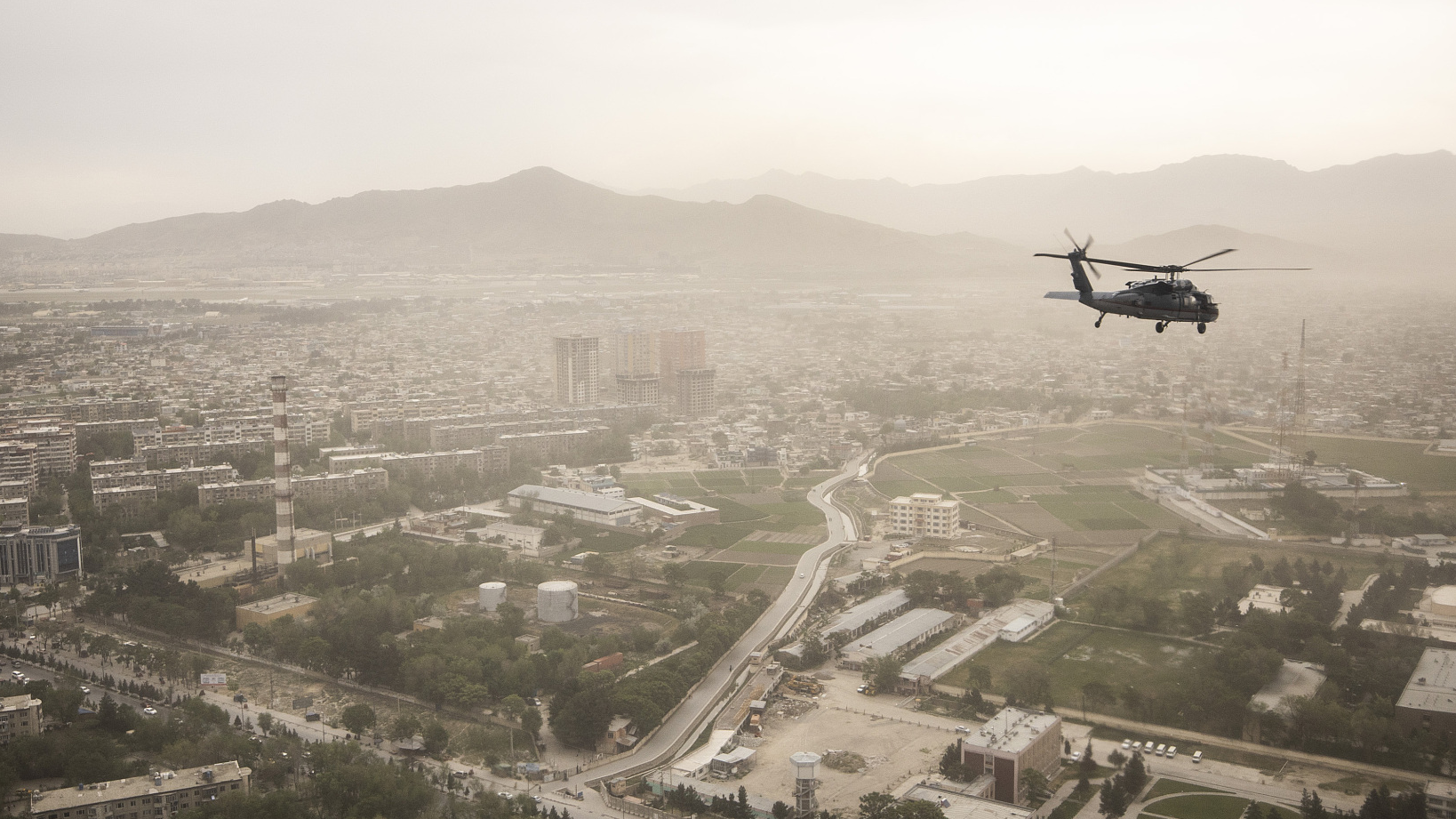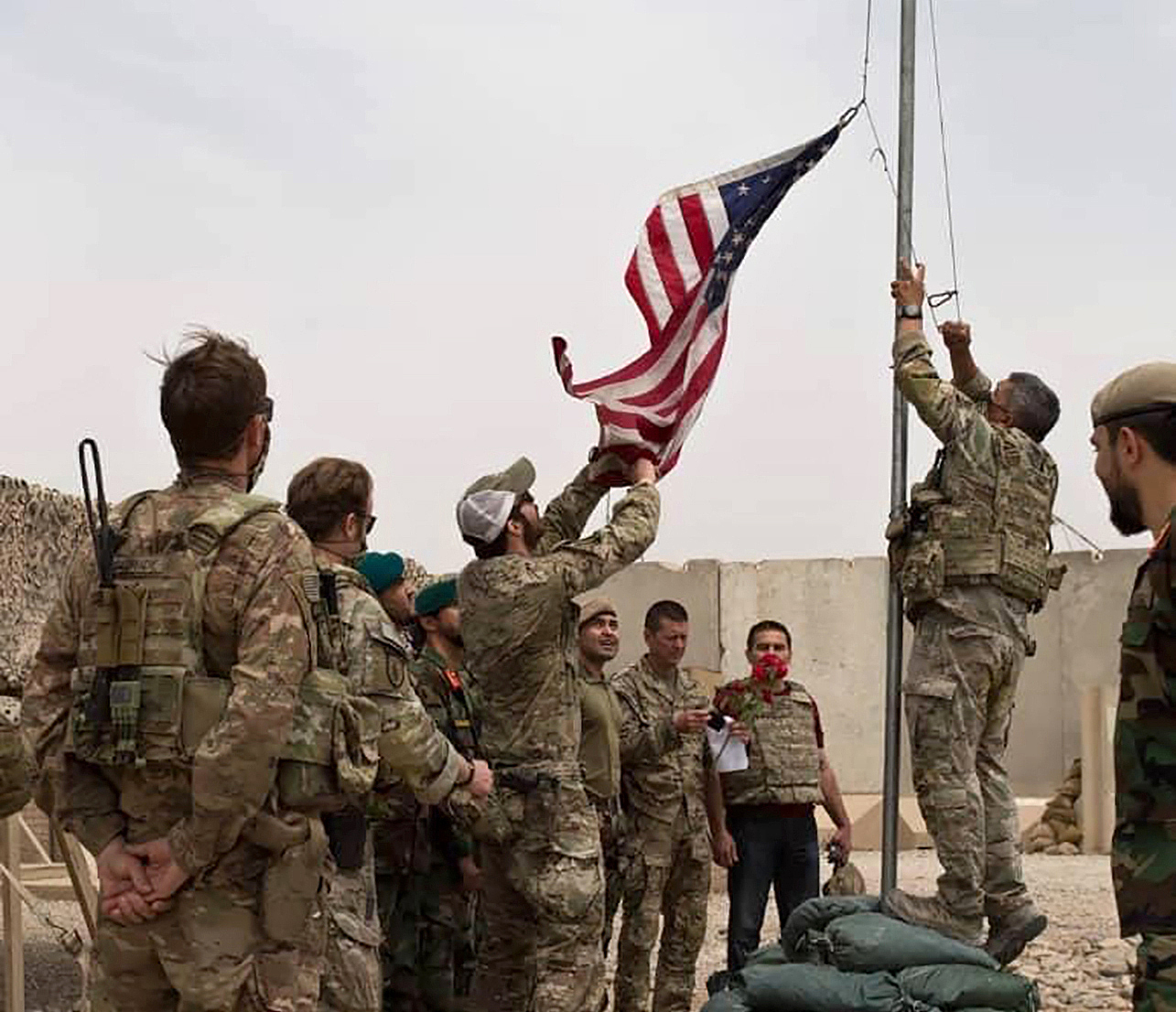
A Black Hawk helicopter of the U.S. Air Force is pictured in front of the cityscape in Kabul, Afghanistan, April 29, 2021. /Getty
A Black Hawk helicopter of the U.S. Air Force is pictured in front of the cityscape in Kabul, Afghanistan, April 29, 2021. /Getty
Editor's note: Freddie Reidy is a freelance writer based in London. He studied history and history of art at the University of Kent, Canterbury, specializing in Russian history and international politics. The article reflects the author's opinions and not necessarily the views of CGTN.
On June 3, a bomb was detonated in Western Kabul, killing four civilians. The attack not only ended the lives of innocent civilians but leaves behind grieving families and friends. The attack went largely unreported. This is by no means an isolated incident and has become a regular occurrence faced by Afghans. As U.S. troops prepare to withdraw in September, is the U.S. leaving the region safer, what lessons have gone unheeded and what have the wider consequences been?
Over the last twenty years, the shock of the 9/11 terrorist attacks has perhaps inevitably lessened. Recalling the shock and horror, both in the U.S. and across the globe, leads to some understanding as to why the International Security Assistance Force (ISAF) – otherwise simply known as "the coalition", was formed and invaded Afghanistan in pursuit of Osama bin Laden and member of his al-Qaeda terrorist network.
As with the superpowers that preceded the U.S., the British in 1839, and the Soviet Union in 1979 found, initial victories were swift, but control of the region was nearly impossible.
When pressed by former diplomat and politician Rory Stewart about what advice a veteran of the Soviet occupation had for U.S. forces in Afghanistan, General Auschev was blunt, "take the fastest route home."
Part of what has made the U.S. withdrawal so difficult is mission creep. Many contemporary critics have argued that coalition forces, whether in Afghanistan or Iraq, failed to adequately plan for what follows the initial conflict. This is arguably only partly true. In the case of Afghanistan, the primary objective was to neutralize al-Qaeda and bring Osama bin Laden to justice.

A U.S. flag is lowered as American and Afghan soldiers attend a handover ceremony from the U.S. Army to the Afghan National Army, at Camp Anthonic, in Helmand province, southern Afghanistan, May 2, 2021. /AP
A U.S. flag is lowered as American and Afghan soldiers attend a handover ceremony from the U.S. Army to the Afghan National Army, at Camp Anthonic, in Helmand province, southern Afghanistan, May 2, 2021. /AP
The problem for the U.S. was that the existing Taliban regime at the time was sympathetic to al-Qaeda and had themselves overseen a brutal regime. The operation consequently necessitated regime change and the installation of a new system of government as part of a radically wider campaign.
Twenty years later, an indicator of the limited success of the operation is the peril faced by the Afghans who worked with coalition forces. These individuals are being forced to flee their country for fear of reprisal.
UK Defence Secretary Ben Wallace warned that "with Western powers leaving, the threat is increasing, including targeted attacks by the Taliban" and that it was "only right" for the UK to expedite the process of allowing Afghans to settle in the UK. Indeed some 1,400 have already left.
If the echoes of previous British and Soviet campaigns in Afghanistan can be heard now, then so too is the parallel of the U.S. withdrawal from Vietnam particularly relevant.
It is also hard to fathom the logic of the decision to choose September 11 as the date for U.S. withdrawal. The symbolism of a Taliban return to power, even in a power-sharing capacity, will be a rallying point for wider U.S. resistance.
While few would argue that the Afghanistan mission has been a success, it is important to recognize, as former president Hamid Karzai acknowledged when leaving office, that "When I first took office, we did not have a flag or a currency. We were the target of foreign agendas. We were homeless in our own country."
The risk is that the government of Ashraf Ghani falls after the U.S. withdrawal with moderate Afghans once again forced into physical or ideological "homelessness in their own country", compounding the senselessness of the death of 38,000 Afghan civilians in the conflict.
The failures of the campaigns in Afghanistan and Iraq have also had far-reaching consequences, dramatically influencing U.S. and coalition reluctance to intervene in other global conflicts. Nowhere is this truer than Syria, where even the use of chemical weapons failed to trigger a response in a conflict where over 100,000 civilians have died, with 6 million displaced.
Barack Obama's former advisor Ben Rhodes adroitly summarised the U.S. dilemma, a dilemma of which Afghan citizens must suffer the consequences, "I support the withdrawal as a necessary pivot: at some point, we have to stop fighting, and something has gone wrong when Americans are serving in a war that started before they were born. On the other hand, as our British allies have pointed out, the future will grow darker for Afghans who have suffered greatly and believed in us."
(If you want to contribute and have specific expertise, please contact us at opinions@cgtn.com.)

